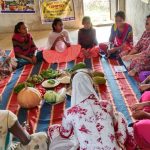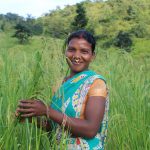The project aims to empower 2.000 vulnerable rural families in Odisha, India by improving food security and dietary health through sustainable nutrition gardens. It addresses severe food insecurity and the impacts of climate change by providing targeted training in climate-adaptive subsistence farming and raising awareness about nutrition and dietary diversity. Main activities include motivating women to establish nutrition gardens, conducting comprehensive training on sustainable agricultural practices, setting up seed banks, and implementing climate alert systems. The project will also mobilise communities to utilise available schemes related to livelihood improvement. The project aims to engage stakeholders to work for inclusion of subsistence farming in government schemes related to climate vulnerability. These efforts aim to enhance community resilience and build local capacity and a solid foundation for long-term self-sufficiency and improved health outcomes.
The purpose of the project is to empower vulnerable rural families to improve their food security and dietary health through sustainable nutrition gardens. The communities face significant challenges in accessing nutritious food due to limited skills, knowledge, and climate-related risks. This project addresses these challenges through targeted training in climate-adaptive subsistence farming and enhancing awareness of nutrition and dietary diversity. By equipping families with the tools, knowledge, and skills needed to manage their gardens and adapt to environmental changes, the project seeks to reduce severe food insecurity and malnutrition. Additionally, it aims to strengthen community resilience against the adverse effects of climate change, fostering long-term self-reliance and better health outcomes in vulnerable communities. By developing local capacity through seed banks and community climate alert system, it aims to strengthen community organization, enhance civil society, and promote collective action. Through community advocacy activities, the project will address gaps in existing government schemes related to the impact of climate change. It will especially focus on inclusion of subsistence farmers in insurance and adaption schemes.
This program intervention, supported by Aktion Bornehjaelp (Action Child Aid), Denmark, is being implemented across 128 villages covering 2000 vulnerable rural families in three blocks, one from Rayagada district and two from Gajapati district in Odisha since 2025.


